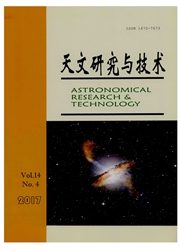

 中文摘要:
中文摘要:
针对射电天文抗干扰技术对于射电天文观测设备灵敏度的影响,分析了评估自适应波束形成技术对阵列接收系统的噪声温度影响。首先通过噪声信号模型,获取了影响系统噪声温度变化的参数,并在此基础上研究了天线增益、接收机增益和耦合性等系统参数的不确定性对于噪声温度的影响,最后利用仿真实验分析了理想系统条件下当前主要的自适应波束形成算法对于系统噪声温度的影响。结果表明基于自适应波束形成的抗干扰方法在天文信号源和干扰信号源重合的情况下已不再适用。
 英文摘要:
英文摘要:
For evaluating effects of the interference mitigation technology on the sensitivity of an astronomical radio device, we propose a method to estimate the influence of the adaptive beam-forming technique on the noise temperature of an antenna array receiver system. Using a correct noise model we derive the relation between noise temperature and system parameters. We subsequently use the relation to analyze how the uncertainties of some system parameters ( e. g., antenna gain, receiver gain, and system coupling) are affected by the noise temperature. We use simulations to test the influence of the current main adaptive beam-forming algorithm on the noise temperature. The results indicate that the interference mitigation processing based on the adaptive beam-forming technique is insufficient in cases that astronomical signals and interference signals severely overlap. It appears necessary to solve this problem by combining other interference mitigation methods in the temporal or frequency domain with the adaptive beam-forming technique. Our analysis results need to be further verified for real situations.
 同期刊论文项目
同期刊论文项目
 同项目期刊论文
同项目期刊论文
 期刊信息
期刊信息
